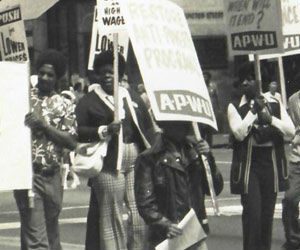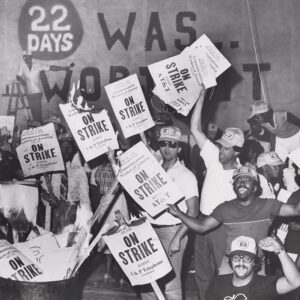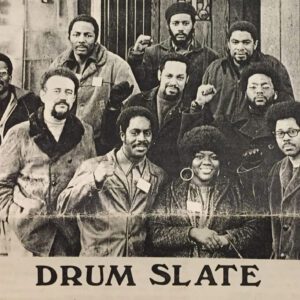June 30, 2005
Labor Movement’s Social Conscience
(This article was first published in the July/August 2005 issue of The American Postal Worker magazine.)
Remembered mainly as the longtime president of the United Auto Workers, Walter Reuther was one of the modern labor movement’s most important figures, not only because of his success as a union leader, but because of his lifelong passion for social and economic justice.
Born in Wheeling, WV, in 1907, Reuther adopted these values as a youngster. His father, German immigrant Valentine Reuther, was a brewery-wagon driver and local labor leader who led regular family discussions on the societal role of unions.
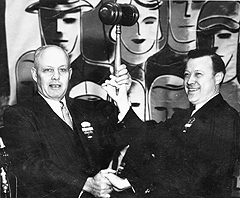
Following an apprenticeship as a tool and die maker, Reuther, along with his older brother Roy moved to Detroit in 1927 (a third brother, Victor, would join them there in 1932), where he worked for Ford. A skilled mechanic, he became a leader in the workplace, and was fired in 1932 for union activity.
Walter and Victor spent three years abroad, even working for a time in a Russian auto factory, then returned to Detroit. Walter worked as an organizer for the recently formed UAW and the Reuther brothers played a key role in the famous sit-down strike at the GM plant in Flint in 1937. That led to company recognition of the union and, after a similar action at Chrysler, a dramatic boost in UAW membership.
Elected president in 1937 of the 30,000-member UAW Local 174, Reuther set his sights on Ford. Not only was Henry Ford virulently anti-union, the company boasted a “security network” of some 2,000 spies and thugs.
The Eyes of the Nation
Reuther came to national prominence on May 26, 1937, when he and other union officials tried to hand out pro-union leaflets at a gate to a Ford plant in Dearborn. Reuther invited the press, prominent members of the clergy, and local government officials to witness the event. What they saw was the “Battle of the Overpass, a severe beating of the union supporters by company agents, who also confiscated reporters’ notebooks and cameras.
The violent suppression of union activity was a public relations disaster for Ford, which received sanctions from the NLRB and later agreed to its first UAW contract.
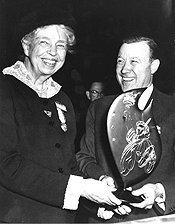
The “Battle of the Overpass” would not be the only time Reuther put life and limb on the line: In 1938, he narrowly escaped a kidnapping and, a decade later, he was nearly murdered by a shotgun blast.
The War Years
By the outbreak of World War II, after auto-plant employees had secured significant gains in wages and union rights, Reuther had become a nationally recognized leader. President Roosevelt offered him senior jobs in the government, which Reuther rejected. But he became a frequent consultant to the president and developed a life-long friendship with the influential first lady, Eleanor Roosevelt.
After the war, additional wage and benefit gains for autoworkers were at the top of Reuther’s agenda. He led a strike against the very prosperous GM and demanded that the company open its books to prove it could not afford to share its wealth with workers.
Although GM never did open its books, significant gains for workers propelled Reuther to the UAW’s presidency, a post he held from 1946 until his death in a plane crash in 1970.
Business, Social Unionism
The UAW under Reuther was arguably America’s most successful union, showing consistent gains in wages, job security, health care, vacation, and pension benefits. Reuther also spearheaded efforts to provide supplemental unemployment benefits, which provided much-needed economic security during the auto industry’s frequent layoff cycles.
In a side role, Reuther took command of the Congress of Industrial Organizations (CIO) in 1951. He facilitated its merger with the American Federation of Labor (AFL) in 1955, becoming the head of its Industrial Union Department. His disagreements with George Meany, the AFL president who was the first president of the merged AFL-CIO, led to his withdrawing the UAW from the federation in 1968. (The UAW re-affiliated with the AFL-CIO in 1981.)
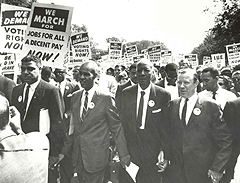
Reuther had achieved much for the UAW, but he also believed in “a labor movement whose philosophy demands that it fight for the welfare of the public at large.”He prodded fellow union leaders to tackle social problems, issues seemingly outside the realm of the bargaining table.
Civil Rights Champion
Reuther’s greatest legacy was in helping to gain union support for the civil rights movement, a cause he had backed publicly since leading an effort to desegregate a swimming pool in the 1930s. In early 1963, the Rev. Martin Luther King Jr. organized a “Walk to Freedom” in Detroit, an event intended as a warm up for the “March on Washington.” The UAW gave King an office, staff, and financial support. Reuther walked alongside King at the event, which drew 200,000 people. That August, Reuther was again with King, as he delivered his historic “I Have a Dream” speech at the Lincoln Memorial.
Reuther was also a frequent advisor to President Johnson. He influenced the expansion of the government’s role as a guarantor of civil liberties and helped build support for LBJ’s War on Poverty.
It’s clear that Reuther saw the labor movement as an instrument of social progress. In contrast to the rigid “business unionism” practiced by so many other labor leaders, Reuther concerned himself with matters rarely touched on in contract talks. He was a true “social unionist,” every bit as concerned with changes to society as he was with changes to the workplace.
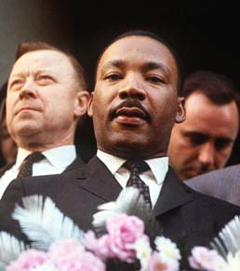
“The labor movement is about that problem we face tomorrow morning at work,” he said. “Damn right! But to make that the sole purpose of the labor movement is to miss the target. What good is a dollar an hour more in wages if your neighborhood is burning down? What good is another week’s vacation if the lake you used to go to is polluted?”
As Time magazine noted in naming him one of the 100 most important people of the 20th Century, “Reuther threw his weight behind the public issues of the day. …He viewed the role of the union as a social movement aimed at uplifting the community within the guarantees of democratic values.”
Elisabeth Reuther Dickmeyer has written a critically acclaimed account of the UAW influence on standards for healthcare and pension benefits and how it spread to other industries and helped create the American middle class. Her book, “Putting the World Together: My Father Walter Reuther — The Liberal Warrior,” is available at www.puttingtheworldtogether.com.

